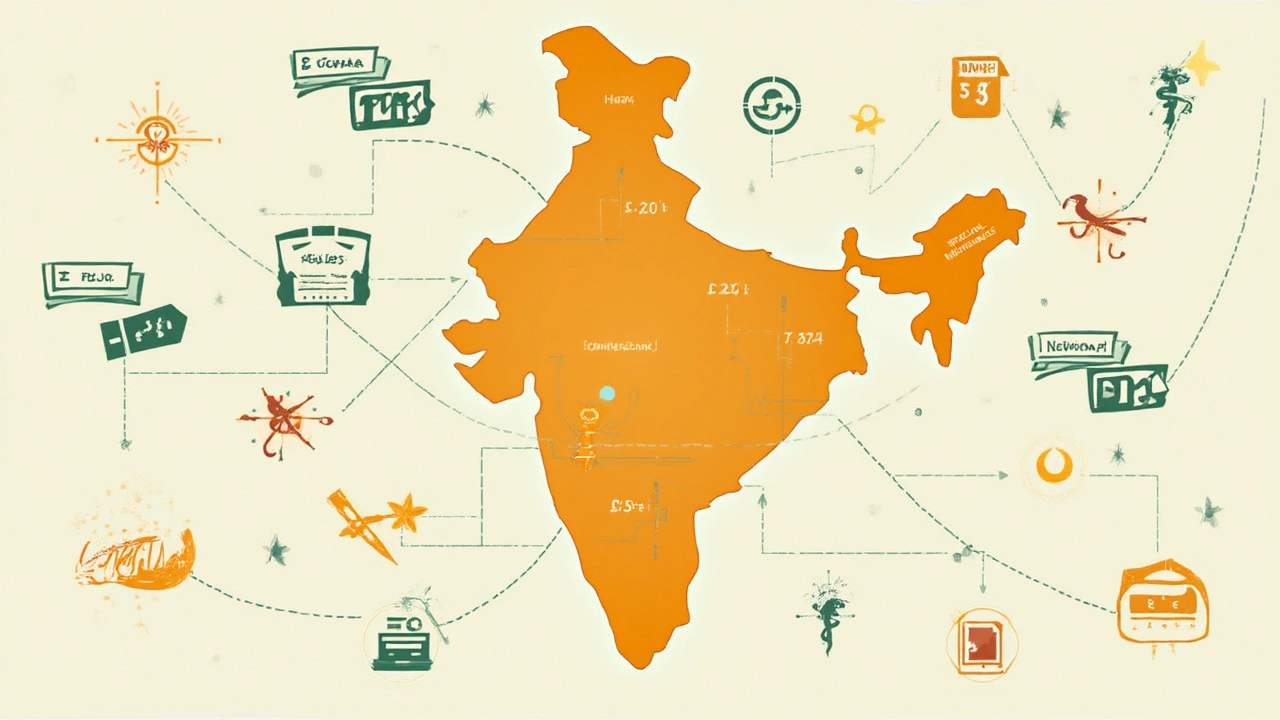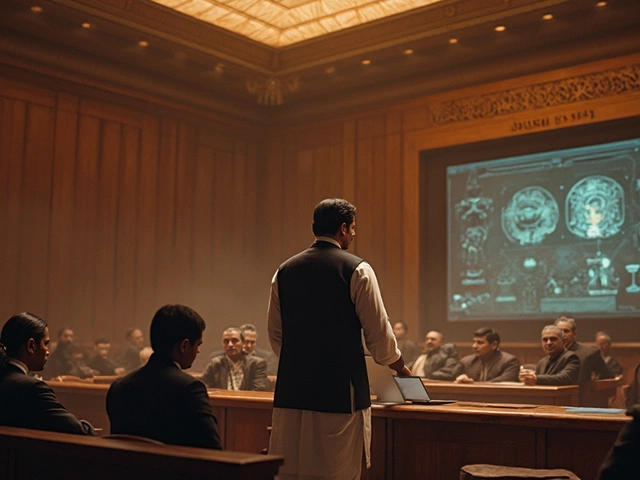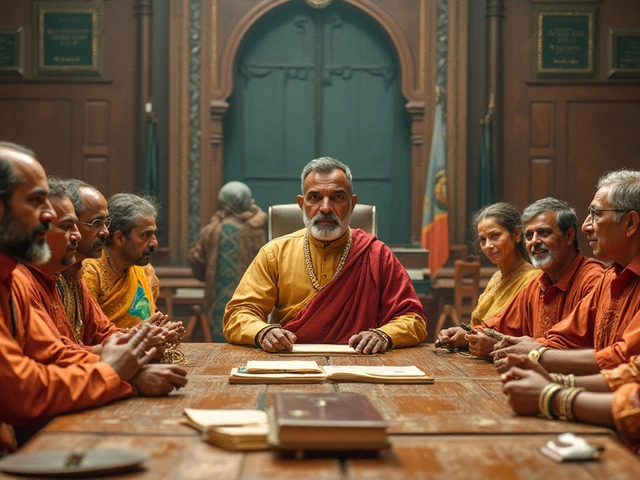Dealing with government offices often feels like a mystery, especially when it comes to what you’ll actually pay. If you’re planning to register your marriage in India, don’t be surprised if the amount you hear from one person is different from what the next person tells you. That’s because there’s no fixed, all-India fee—everything depends on where and how you register.
The typical registration fee can be as low as ₹100 if you go by the book and you’re registering under the Hindu Marriage Act. But if you opt for the Special Marriage Act (which covers interfaith marriages or couples skipping religious ceremonies), you could be shelling out anywhere from ₹150 to ₹500 just for the official paperwork. Some states charge even more, and you can expect extra costs for getting your marriage certificate printed, notarized, or delivered.
It’s not all about the paperwork fee, either. Some local registrars add a little something for the ‘service’, or you might run into not-so-official helpers who offer to “speed things up” for an extra tip. You don’t have to take their bait—most of the process is straightforward if you have all your documents ready and double-check the up-to-date fee on your state government's website before you go.
- Why Registering Your Marriage Matters
- How Much Does the Registration Cost?
- State-by-State Fee Differences
- Special Marriage Act vs Hindu Marriage Act Fees
- Hidden Costs and Extra Charges
- Smart Tips to Save Money and Hassles
Why Registering Your Marriage Matters
Skipping marriage registration might sound tempting, but it can create headaches down the road. A registered marriage is the only legal proof that you and your partner are officially married. The wedding photos, rituals, or the big fat feast don’t count in the eyes of Indian law—your marriage certificate is what matters.
Think about the practical stuff. You’ll need your marriage certificate to get a spouse visa if you ever want to move abroad together. It’s also required if you decide to update your spouse’s name on your passport, bank accounts, or insurance paperwork. If there’s a dispute or any legal matter involving property, or if one partner passes away, the certificate makes things clear and prevents most family drama.
The Supreme Court even said in 2006 that registering marriages should be compulsory—it protects the rights of both husband and wife, and especially helps women prove their marital status in legal or welfare cases. Without registration, it’s tough to claim alimony, inheritance, or to show “who’s who” in complicated situations.
- It helps prove your relationship in court, banks, and embassies.
- Makes divorce or separation smoother if things go wrong—no certificate, more delays.
- Essential if a foreign country asks for legal marital proof.
- Needed for government benefits and joint property claims.
Resist the urge to put it off or look for shortcuts—a proper marriage registration cost is a small price to pay for future peace of mind.
How Much Does the Registration Cost?
If you walked into a marriage registrar’s office today, you’d probably see a fee chart pasted on the wall. But don’t assume that’s the final number you’ll pay. The marriage registration cost in India isn’t standard. It depends on your location, the law under which you marry, and sometimes even the day you show up.
For most people tying the knot under the Hindu Marriage Act, the fee is usually the lowest—it’s often just ₹100 in metro cities like Delhi and Mumbai. If you’re using the Special Marriage Act, especially if you or your partner are from different religions, the price goes up. For this act, you might end up paying anywhere from ₹150 to ₹500, depending on your city.
Just to give you real numbers, here’s a small breakdown of fees known in some popular states and cities:
| State/City | Hindu Marriage Act | Special Marriage Act |
|---|---|---|
| Delhi | ₹100 | ₹150 |
| Mumbai (Maharashtra) | ₹100 | ₹150 |
| Bangalore (Karnataka) | ₹115 | ₹165 |
| Uttar Pradesh | ₹100 | ₹150-₹500 |
| Chennai (Tamil Nadu) | ₹100 | ₹150 |
This table’s got your back if you want a quick glance. But here’s the catch—if you miss the deadline for registration, there’s a late fee. In Delhi, for example, if you don’t register your marriage within 60 days, you end up paying an extra ₹200 to ₹400.
Besides the core marriage registration cost, you’ll want to budget a bit more for things like getting extra copies of your marriage certificate (usually ₹10 to ₹50 per copy), paying for document notarization, and maybe a bit for any affidavits or forms you need to fill at the registrar’s office.
- Always check your local municipal or district website for the most current official rates.
- If possible, try to complete everything without the help of middlemen—they almost always add unofficial costs.
- Hang on to all receipts—you’ll need them for any disputes or future copies.
The fees aren’t meant to break your bank, but being prepared will save you money and stress. Double-check everything—sometimes, what’s written online is out of date, and only the registrar’s office knows the real story right now.
State-by-State Fee Differences
If you ask what it costs to register your marriage in India, the answer quickly turns into, “Well, where do you live?” Each state sets its own fee, and there’s no single national rulebook. Even neighbors in Delhi and Haryana will notice a difference.
Here’s a quick look at what you can expect to pay for marriage registration cost in a few major states and cities as of 2025:
| Location | Hindu Marriage Act Fee (₹) | Special Marriage Act Fee (₹) |
|---|---|---|
| Delhi | 100 | 150 |
| Maharashtra (Mumbai/Pune) | 100 | 150 |
| Karnataka (Bangalore) | 160 | 200 |
| Uttar Pradesh | 100 | 150 |
| Tamil Nadu (Chennai) | 100 | 150 |
| West Bengal | 200 | 400 |
| Kolkata | 200 | 400 |
Check your local Municipal Corporation website or marriage registrar’s office for the real deal, because small towns sometimes charge less, and metro cities rarely let things stay this cheap for long.
- Some states add extra processing fees or demand a small fee for certified copies. In Maharashtra, there’s a ₹20 charge if you want a copy of your certificate right away.
- If you’re registering late (typically after 60 or 90 days from marriage), you may have to pay a penalty. For example, in Delhi, it’s an extra ₹500 if you miss the deadline.
Keep a little extra cash handy in case you need it for affidavits, additional copies, or sudden little charges that pop up.

Special Marriage Act vs Hindu Marriage Act Fees
If you’re looking into marriage registration cost in India, the law you register under makes a real difference. Most couples in India choose either the Hindu Marriage Act (HMA) or the Special Marriage Act (SMA). The rules and the money you pay out—yep, both change depending on what you pick.
Let’s break it down. The marriage registration cost under the Hindu Marriage Act is typically lower. In a lot of states, the government charges just ₹100 for the registration itself, and you might pay another ₹10 for the marriage certificate. Meanwhile, the Special Marriage Act usually costs more because the whole process is a bit more involved (more paperwork, a mandatory 30-day notice, and verification steps).
Here’s a quick look at actual numbers for some major states:
| State | Hindu Marriage Act Fees | Special Marriage Act Fees |
|---|---|---|
| Maharashtra | ₹100 | ₹150 |
| Delhi | ₹100 | ₹150 |
| Tamil Nadu | ₹100 | ₹150 |
| West Bengal | ₹200 | ₹400 |
| Karnataka | ₹120 | ₹200 |
If both partners come from the same faith (Hindus, Sikhs, Jains, and Buddhists), the Hindu Marriage Act is the way to go for simpler documentation and lower fees. The Special Marriage Act is meant for couples from different religions, NRIs, or those who want a civil/modern marriage that skips religious ceremonies. But here, you’ll face that notice period and tougher ID/address requirements.
Don’t forget: These are just basic registration costs. Every state’s registrar office might tack on minor charges for things like extra copies, urgent processing, or late fees if you delay registration (which can be ₹200 or more).
The smartest move? Check your state’s marriage registration portal before you start so you know exactly what you’ll be spending—and don’t get caught off guard.
Hidden Costs and Extra Charges
Here’s the thing—registering your marriage is rarely as cheap and straightforward as the basic fee makes it sound. The official amount, which most states list clearly on their websites, covers only the main application or registration. But couples often run into sneaky extra costs that aren’t mentioned up front.
First up, there’s a strong chance you’ll need to get a bunch of documents photocopied, notarized, or even translated, depending on your background. Each document might set you back between ₹20 and ₹200 per page at most local offices. Need a witness who isn't family or handy? Some people actually end up paying someone for this favor, especially if they’re new in town or both sides’ families live far away.
Digital photos for the application are needed too, and these usually aren’t free. Even small things like stamping fees or the cost to get extra copies of your marriage registration cost receipt or certificate can creep up—think ₹50 to ₹200 a pop. Plus, after the certificate is issued, if you want extra copies (most embassies and banks ask for at least two), expect to pay some more.
- Notarization: ₹50 – ₹200 per document, depending on where you get it done.
- Document translation: ₹300 – ₹1,000 per page if one of the partners isn’t fluent in English or the state language.
- Postal or courier services for home delivery: ₹100 – ₹300 for safe transit, especially if you’re abroad.
- Photographs and photocopies: ₹10 – ₹100 each, depending on the shop and your city.
Another cost trap: special "agents" around the registrar’s office promising to get things done faster. And, to be blunt, unofficial “service charges” (meaning, bribes) do still happen in some places, even in 2025. A study published by Moneylife in 2023 found that couples in metros like Mumbai and Delhi sometimes spend up to ₹2,000 extra to “grease the wheels.”
“If you arrive with the right documents and patience, official costs are usually minimal. But if you’re in a hurry or don’t know your rights, you’ll end up paying more—for speed and convenience,” says Mumbai legal expert Aditya Shenoy.
Your best move? Double-check requirements and fees online, keep extra copies of everything, and politely say no to anyone offering shortcuts for cash. The true cost is almost always less than what the touts at the gate claim.
Smart Tips to Save Money and Hassles
Let’s be honest, nobody wants to waste time or spend extra rupees at the marriage registrar’s office. If you want the process to be smooth and cheap, the best edge is knowing the steps and sticking to them. Here’s how you can avoid surprise costs, useless delays, and the headache that comes with standing in government lines.
- marriage registration cost—don’t guess it, check it. Every state has its own official fee. For example, Mumbai charges ₹100 for the Hindu Marriage Act and ₹150 under Special Marriage Act, while Delhi goes ₹100 and ₹150 too, but in Tamil Nadu, it can hit ₹500 under the Special Marriage Act. Always check your local municipal or district website before you step out.
- Forget “agents” and touts. If someone outside the office says they can “fast track” your application for a fee, just walk away. All payments should be official—usually by e-challan, demand draft, or through an online portal. Ask for a receipt always.
- Save on photocopies and document runs. Bring extra copies of your documents and passport photos—sometimes, the staff may ask for more than listed. If you run out, photocopy shops nearby will charge a premium.
- Do the paperwork during off-peak hours. Weekends and Mondays are crowded. Try midweek early mornings to spend less time waiting.
- File the application online, where possible. Cities like Delhi, Bangalore, and Hyderabad offer online booking and payments. This cuts out shady fees and long queues.
- Know the must-have documents. Messing up here is how most people lose money and time. Regardless of the state, you’ll usually need:
- Identity and address proof for both parties (Aadhaar, passport, voter ID)
- Age proof (birth certificate, 10th mark sheet)
- Marriage invitation card or a photo of the wedding ceremony
- Passport sized photos (usually 2-4 each)
- Witness ID and address proof (at least 2 witnesses)
Keep everything self-attested, and pack it in a single folder. This way, you don’t run around for signatures or missing forms on the big day.
| City | Hindu Marriage Act | Special Marriage Act |
|---|---|---|
| Delhi | ₹100 | ₹150 |
| Mumbai | ₹100 | ₹150 |
| Bangalore | ₹200 | ₹350 |
| Chennai | ₹150 | ₹500 |
| Kolkata | ₹200 | ₹250 |
Your final bill for marriage registration should almost never cross ₹500 if you stick to official steps. If someone asks for more, ask why—and don’t hesitate to complain to the local officer-in-charge. Always trust the government’s website and receipts, not the buzz at the entrance.


